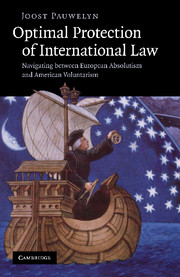 Optimal Protection of International Law
Optimal Protection of International Law Book contents
- Frontmatter
- Contents
- Table of cases
- Table of treaties
- Table of international documents
- Acknowledgments
- Abbreviations
- Foreword
- Introduction
- 1 Overview and relevance of the analysis
- 2 The two extremes of European absolutism and American voluntarism
- 3 Allocation, protection and back-up enforcement of entitlements
- 4 How should international law entitlements be protected?
- 5 How are international law entitlements currently protected?
- 6 Back-up enforcement in international law
- 7 Conclusion
- References
- Index
5 - How are international law entitlements currently protected?
Published online by Cambridge University Press: 07 July 2009
- Frontmatter
- Contents
- Table of cases
- Table of treaties
- Table of international documents
- Acknowledgments
- Abbreviations
- Foreword
- Introduction
- 1 Overview and relevance of the analysis
- 2 The two extremes of European absolutism and American voluntarism
- 3 Allocation, protection and back-up enforcement of entitlements
- 4 How should international law entitlements be protected?
- 5 How are international law entitlements currently protected?
- 6 Back-up enforcement in international law
- 7 Conclusion
- References
- Index
Summary
This chapter tests the normative predictions developed in the previous chapter. It looks at whether this book's framework of variable protection of entitlements – based on inalienability, property rules and liability rules – finds application in the formal standards of protection set out in current general international law. The ILC Articles on State Responsibility are used as reflective of this general international law. A limited number of specialized treaty regimes are also tested. As a descriptive matter, or a question of how the law currently is (lex lata), both European absolutism and American voluntarism are wrong. International law entitlements are not sacredly protected as inalienable, nor simply protected by a mere liability rule. As predicted, international law is, by default, protected by a property rule. Only in limited circumstances are entitlements made inalienable or protected by liability rules.
International law is, in principle, not inalienable
In contrast to the demands of European absolutism, most entitlements under current international law can be transferred, or contracted out from, at will and are, therefore, not inalienable. What follow are the default rules of protection of international law entitlements.
First, states have the right to amend treaties by agreement between the parties. Therefore, as between a willing seller and a willing buyer, treaty entitlements can be transferred and are not inalienable. Second, states are equally free to contract out of customary international law (in particular the general law of treaties and state responsibility) when crafting new treaties.
- Type
- Chapter
- Information
- Optimal Protection of International LawNavigating between European Absolutism and American Voluntarism, pp. 107 - 147Publisher: Cambridge University PressPrint publication year: 2008


